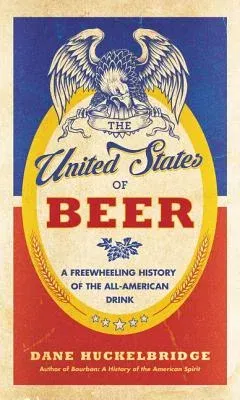From the author of "the definitive history of bourbon" (Sacramento
Bee) comes the epic true tale of how beer conquered America, from B.C.
to Budweiser and beyond
Equally irreverent and revealing, Dane Huckelbridge's masterful cultural
history charts the wild, engrossing, and surprisingly complex story of
our favorite alcoholic drink, showing how America has been under the
influence of beer at almost every stage. From the earliest Native
American corn brew (called chicha) to the waves of immigrants who
brought with them their unique brewing traditions, to the seemingly
infinite varieties of craft-brewed suds found on tap today, beer has
claimed an outsized place in our culture that far transcends its few
simple ingredients--water, barley, and hops. And yet despite its
ubiquity--Americans consume some six billion gallons of beer each
year--the story of beer in the USA is as diverse and fascinating as the
country itself, overflowing with all the color and character of
America's many peoples and regions.
A brewery was among the first orders of business when the Pilgrims
landed at Plymouth Rock, and George Washington tried (but mostly failed)
to produce beer at Mount Vernon. Since 1776, America has operated under
the principle of E. Pluribus, Brewdog: out of many regional brews, one
nation of beer drinkers. The first "macrobrew" revolution was in the
Midwest, where an influx of German immigrants in the 1800s changed
American brewing forever. Bavarian newcomers brought their now-universal
lager to St. Louis, Milwaukee, and the rest of the heartland; Busch,
Pabst, and Schlitz soon followed, establishing the first great beer
empires and ushering in a golden age of brewing that would last into the
twentieth century. Then in 1920, Prohibition threatened the very
existence of beer in America. Brewers were forced to diversity into a
variety of odd products--among them malted milk, porcelain, and
cement--in order to survive.
When the spigot finally reopened in 1933, many breweries were tapped
out. By the early 1980s, a country that once boasted more than a
thousand breweries was down to a few dozen, with little to distinguish
among them. But stirred by the American entrepreneurial spirit, a cadre
of daring young trailblazers decided our options shouldn't be limited to
watery, flavorless macrobrews. The microbrew movement began on the West
Coast, but quickly spread: today there are thousands of craft breweries,
scattered across all fifty states.
Drawing upon a wealth of little-known historical sources, explaining the
scientific breakthroughs that have shaped beer's evolution, and mixing
in more than a splash of dedicated on-the-ground research, The United
States of Beer offers a raucous and enlightening toast to the
all-American drink.

